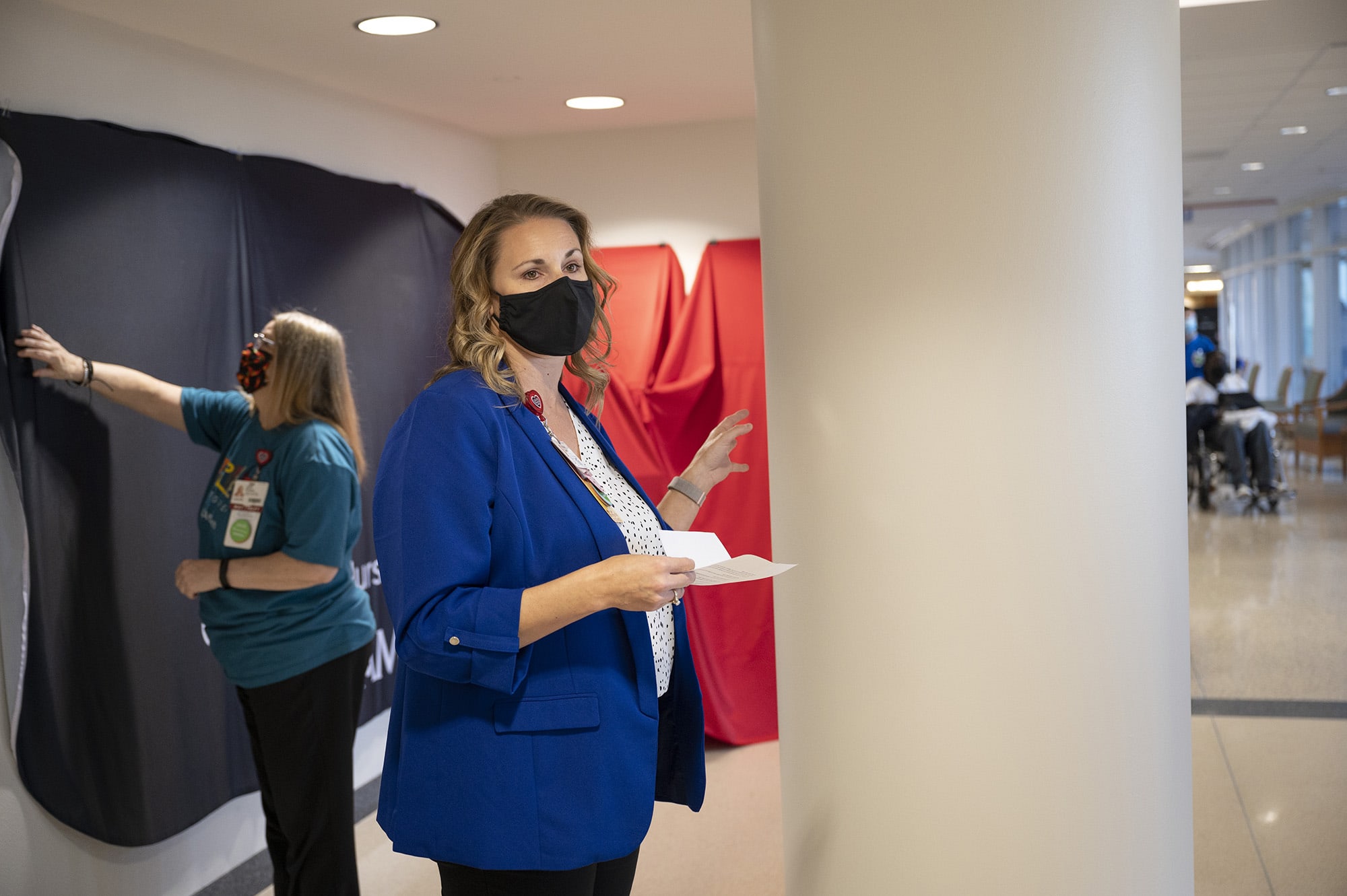View Larger Image

Rebekah Thacker, right, speaks Dec. 6 before the public unveiling of the new DAISY wall at UAMS.
Image by Evan Lewis
UAMS Patient Story, Nurses Get National Acclaim
| Out of 1.8 million stories of nurses worldwide caring for patients, the story of a family at UAMS and its gratitude for two nurses took center stage at a national nursing conference.

The story of Jodie McGinley and her two sons was spotlighted at this Magnet Conference breakfast in November in Atlanta.
And, in early December, 12 UAMS nurses who each had won a monthly DAISY award in the preceding year gained greater recognition on a new DAISY wall on the first floor of the Medical Center. The Diseases Affecting Immune Systems (DAISY) Award offers patients, families and others a means to express gratitude for the extraordinary skill and compassion that nurses provide in care delivery.
Shortly before Rebekah Thacker, MNSc, left in November to travel to Atlanta for the three-day American Nurses Credentialing Center (ANCC) National Magnet Conference, she learned that Jodie McGinley, a mother of twins, and nurses Laura Ryan, RN, and Lindsey Grignon, RN, would take the stage at a conference breakfast to tell their story of compassionate care at UAMS. (Ryan worked previously in the Neonatal Intensive Care Unit at UAMS Medical Center and Grignon in the NICU at Arkansas Children’s.)
“I couldn’t believe it,” Thacker said. “Here was UAMS being featured on a national stage out of the 1.8 million stories submitted. I hear these stories in our hospital all the time because this is just how we deliver care at UAMS, but it just blew their minds. It was great to see the reactions of the audience.”
Thacker is the nursing director of Research, Excellence and Magnet. UAMS is working toward Magnet status as part of ANCC’s Magnet Recognition Program, which designates organizations worldwide where nursing leaders align their strategic goals to improve the organization’s patient outcomes.
In 2009, McGinley gave birth at UAMS to two twin boys, Eli and Walker. A nurse practitioner took her and her husband aside to fully explain the medical condition of their son, Eli, showing them that much of the boy’s brain was absent.
“Things did not turn out how we wanted, but a nurse practitioner made all the difference for us,” McGinley said in 2018. “Had she not pulled us aside, we would have a son at home on a machine because we didn’t know. Nursing is not always easy. It’s not butterflies and cupcakes. I can’t imagine what she felt that day.”
Instead of surgery for Eli, the McGinleys chose to withdraw breathing support and donate his organs. When support was removed, Eli surprised everyone by continuing to breathe for 31 more hours.
Eli was at Arkansas Children’s, while Walker was in the NICU at UAMS for a pulmonary problem. Going between the two hospitals and being separated from one of their boys was the family’s “darkest hour,” McGinley said.
At the suggestion of a neonatologist and with the help of many nurses, the boys were reunited in the NICU at UAMS.
A UAMS nurse grabbed McGinley’s camera to take the only photo of the twins alive and together, one of the most precious photos she has today, she said.
Eli’s organ donations were used to help two other children who still are alive today.
“My husband and I are so grateful we had just the right nurses at just the right time,” McGinley said. The McGinleys have since had two healthy girls, ages 7 and 3.
When McGinley told her story at the Magnet Conference, many members of the audience of several hundred cried, Thacker said.
The McGinley’s story also recently was featured in the Journal of Nursing Administration.

The new DAISY wall, shown here during and after its unveiling, honors the compassionate care provided by UAMS nurses.Image by Evan Lewis
It is nurses like Ryan and Grignon who are recognized each month as DAISY Award winners. Thacker said “meaningful recognition” of nurses is a “core principle” of nursing excellence and Magnet status. UAMS has been a partner with the national DAISY Foundation for more than 13 years.
DAISY awardees at UAMS have long been recognized with pins, certificates and even cinnamon rolls.
“I had the idea for the wall earlier this year,” Thacker said. “We’ve never had a place to celebrate all the winners for the year.”
Thacker requested and received permission to use a wall space near the patient discharge area on the first floor of the UAMS Medical Center. It was unveiled Dec. 6. A plaque recognizes each DAISY nurse and their stories, and will remain on the wall for 12 months when another nurse is recognized for that month a year later.
DAISY applies to Magnet designation because meaningful recognition directly relates to retention of nurses and engagement, Thacker said.
“All hospitals are struggling with engagement and retention right now, and any step forward in meaningful recognition is a step in the right direction to improving those things,” Thacker said. “That was one of the reasons we wanted to do this DAISY wall. Additionally, we have it in the discharge area so our families can see, ‘Oh, these are the stories about these compassionate nurses, and I want to submit a story about my compassionate nurse.’”
According to the DAISY Foundation, its programs “express gratitude to nurses that recognize them for the extraordinary skillful, compassionate care they provide patients and families.”

UAMS nurses and other onlookers listen to Rebekah Thacker speak before the unveiling.Image by Evan Lewis